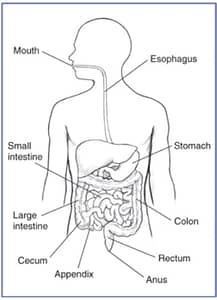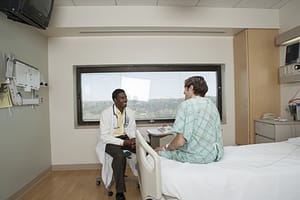About Ulcerative Colitis
What is ulcerative colitis?
 Ulcerative colitis (UC), an inflammatory bowel disease, is a chronic disease that causes inflammation and sores (ulcers) on the inner lining of the large intestine. Crohn’s disease and microscopic colitis are the other common inflammatory bowel diseases (IBDs). The large intestine includes the appendix, cecum, colon, rectum and anus. The large intestine is about 5 feet long in adults and absorbs water and any remaining nutrients from partially digested food passed from the small intestine. It changes waste from liquid to a solid matter called stool. Stool passes from the colon to the rectum. The rectum is located between the lower (sigmoid) colon and the anus. The rectum stores stool prior to a bowel movement.
Ulcerative colitis (UC), an inflammatory bowel disease, is a chronic disease that causes inflammation and sores (ulcers) on the inner lining of the large intestine. Crohn’s disease and microscopic colitis are the other common inflammatory bowel diseases (IBDs). The large intestine includes the appendix, cecum, colon, rectum and anus. The large intestine is about 5 feet long in adults and absorbs water and any remaining nutrients from partially digested food passed from the small intestine. It changes waste from liquid to a solid matter called stool. Stool passes from the colon to the rectum. The rectum is located between the lower (sigmoid) colon and the anus. The rectum stores stool prior to a bowel movement.
Ulcerative colitis, which affects about 700,000 Americans, most often begins gradually and can become worse over time. Symptoms can be mild to severe. Most people have periods of remission, times when symptoms disappear, that can last for weeks or years. The current goal of care is to keep people in remission long term.
Cause of Ulcerative Colitis
The exact cause of UC is unknown. UC is more likely to develop in people between the ages of 15-30, and over age 60. People of Jewish descent or those with a family member who has UC are also at increased risk. Researchers believe the following factors may play a role in causing ulcerative colitis:
- Immune System Dysfunction: Normally, the immune system protects the body from infection by identifying and destroying bacteria, viruses, and other potentially harmful foreign substances. Researchers believe bacteria or viruses can mistakenly trigger the immune system to attack the inner lining of the large intestine. This immune system response causes inflammation, leading to symptoms.
- Genetics: UC can run in families. Research studies have shown that certain abnormal genes may appear in people with UC. However, researchers have not been able to show a clear link between the abnormal genes and ulcerative colitis.
- Environment: Some studies suggest that certain things in the environment may increase the chance of a person getting UC, although the overall chance is low. Nonsteroidal anti-inflammatory drugs (ex: ibuprofen),antibiotics and oral contraceptives may slightly increase the chance of developing UC. A high-fat diet may also slightly increase the chance of getting UC. Some people believe eating certain foods, stress, or emotional distress can cause UC, but studies suggest that these factors solely increase a person’s chance of having a flare-up of UC and are not causative.
Symptoms of Ulcerative Colitis

The most common signs and symptoms of ulcerative colitis are:
- diarrhea with blood or pus and abdominal discomfort
- an urgent need to have a bowel movement
- a feeling of incomplete emptying after a bowel movement
- waking up at night to use the bathroom
- fecal incontinence
- feeling tired
- nausea or loss of appetite
- weight loss
- dehydration
- fever
- anemia
Less common symptoms include:
- joint pain or soreness
- eye irritation
- certain rashes
- delayed growth in pediatric cases
The symptoms a person experiences can vary depending on the severity of the inflammation and where it occurs in the large intestine. When symptoms first appear, most people with ulcerative colitis have mild to moderate symptoms. About 10 percent of people can have severe symptoms, such as frequent, bloody bowel movements, fevers and severe abdominal cramping.
UC is diagnosed by physical examination, blood tests, stool tests, colonoscopy, sigmoidoscopy and biopsies.
Treatment for Ulcerative Colitis
 The goal of ulcerative colitis treatment is to ease the patient’s symptoms giving the colon a chance to heal, and to prevent flare-ups. Ulcerative colitis is generally treated by medications or surgery. Medications include aminosalicylates, corticosteroids, immunomodulators and biologics. Other medications can include pain relief like acetaminophen, antibiotics to treat infection, anti-diarrhea medication or cyclosporine.
The goal of ulcerative colitis treatment is to ease the patient’s symptoms giving the colon a chance to heal, and to prevent flare-ups. Ulcerative colitis is generally treated by medications or surgery. Medications include aminosalicylates, corticosteroids, immunomodulators and biologics. Other medications can include pain relief like acetaminophen, antibiotics to treat infection, anti-diarrhea medication or cyclosporine.
In cases where the patient has colon cancer, pre-cancerous cells, severe disease or has not responded to medication, surgery to remove all or part of the large intestine is performed. If the diagnosis of UC is correct, removing the entire colon will cure ulcerative colitis. Patients who have their colon removed will either have an external ileostomy pouch to collect waste, or an ileoanal resevoir (J-pouch) which is where an internal pouch is created from the end of the small intestine for the collection of stool and attached to the anus. Patients with J-pouches may experience fecal incontinence, and the lining of the pouch can become inflamed, called pouchitis.
Dietary changes can also improve the symptoms of UC.
Complications of Ulcerative Colitis
Complications of ulcerative colitis include:
- rectal bleeding
- dehydration and malabsorbtion
- bone loss – sometimes caused by corticosteroid use
- inflammation is areas other than the large intestine like the liver, skin, eyes or joints
- megacolon – where inflammation causes the large intestine to stop working
- colon cancer
Get Your News and Updates
Please enter your information and you will be added to the list
Your information will never be shared or sold!
